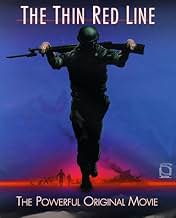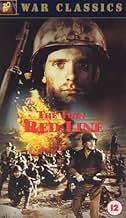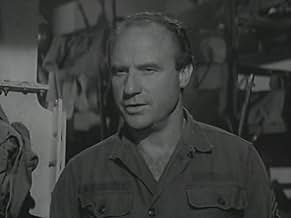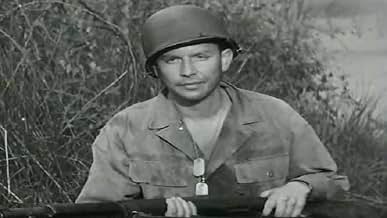In Guadalcanal during World War II, a private and his sergeant clash during the heat of battle with the Japanese.In Guadalcanal during World War II, a private and his sergeant clash during the heat of battle with the Japanese.In Guadalcanal during World War II, a private and his sergeant clash during the heat of battle with the Japanese.
Bob Kanter
- Fife
- (as Robert Kanter)
Jim Gillen
- Capt. Gaff
- (as James Gillen)
Stephen Young
- Stack
- (as Stephen Levy)
- Director
- Writers
- All cast & crew
- Production, box office & more at IMDbPro
Featured reviews
6PKC
A solid effort hampered by the the filmmaking conventions of that time. Some of the acting is amateurish, and the dialogue stilted. But it does confront the serious moral issues of war, unlike most war movies of that era. The theme is essentially the same as the current version -- that is, how does man endure in war? It presents several models for survival. Many of the scenes are exactly the same as in the 1998 version, though it includes others that are not found in Malick. This attempt focuses more on the relationship between Welsh (Jack Warden) and Doll (Keir Dullea). The music is awful, like something out of a cheesy 50s horror flick. Also, it's amazing how much Guadalcanal resembles the high desert of Southern California. But this is well worth a rent if one has the proper expectations...
The first interpretation of James Jones' novel is an OK movie. Nothing really stuck with me, though. It condenses about five characters each into the two lead characters in order to make a well rounded film that fairly expresses Jones' ideas on men in war. It is an interesting psychological study on men, not under stress, but facing death, either from a distance, or up close. There are some great moments in this, and the acting is superb. I did think, though, that the sexual feelings of the novel did not translate so well into the early 60's film. The battle are also utterly unconvincing. Death is still portrayed as a somewhat painless event (with the near exception of one great scene), it leans more to the earlier gung ho war movies than, say, Paths of Glory or All Quiet on the Western Front. The battle scenes are ultimately silly and cartoonish. Two men climb a cliff because the valley below is mined. One knocks over a big rock that causes a chain reaction and all the rocks fall into the valley and clear the mine field. This kind scene is not meant to be surreal, so it loses on the realism scale. This is not the way Jones wanted war depicted. The kind of silly inventiveness of the battle scenes does not exist in all out combat. But, I must say, it does succeed in some scenes, and the performances are all great. I must also say that the end is extremely powerful. It made all the cheesey set pieces and battle scenes disappear from my mind. That last shot is the tone of Jones' novels, a tone From Here to Eternity got right all the way through, and Terrence Malick's Thin Red Line also successfully portrayed (But stepped away to alow contemplation, not to experience.) That last scene makes it a good movie, but it couldn've been done better. Actually, it was done better. I still recommend it. It has its ideas in the right place, but its execution is a bit showy and not realistic enough.
James Jones also wrote "From Here to Eternity", and this novel has been filmed several times, last time in 1998 in colour, but the two versions compliment each other. This one is more stringent and poignant in its psychology and characterizations. Jack Warden and Keir Dullea clash from the beginning, they are both close to the thin red line separating sanity from madness, and they appear as rather half mad both of them, although Keir Dullea seems more liable, as he loses control a number of times. Jack Warden's madness is of a different kind, as he rather drives others mad than goes mad himself, and he is the better soldier of the two.
It's about the critical battler of Guadalcanal, when more men were lost than even the Americans and theír ruthless colonel could afford. Although you don't see much of the Japs, the Americans didn't either, as the Japs were experts on ambushes and targeting Americans unawares, they appear as fearsome soldiers indeed. Many Americans have also testified, that Japanese soldiers were the bravest soldiers of all.
It's a brutal and realistic war account from its worst sides, and if you can stand any amount of war atrocities, this is a film for you. If you can't, you had better stick to something nicer with dames. There are only two dames in this film, one in a short flashback, and the other one isn't even a dame, and her appearance is even shorter.
It's about the critical battler of Guadalcanal, when more men were lost than even the Americans and theír ruthless colonel could afford. Although you don't see much of the Japs, the Americans didn't either, as the Japs were experts on ambushes and targeting Americans unawares, they appear as fearsome soldiers indeed. Many Americans have also testified, that Japanese soldiers were the bravest soldiers of all.
It's a brutal and realistic war account from its worst sides, and if you can stand any amount of war atrocities, this is a film for you. If you can't, you had better stick to something nicer with dames. There are only two dames in this film, one in a short flashback, and the other one isn't even a dame, and her appearance is even shorter.
This version of James Jones' book follows the plot of the novel closely and actually received very high praise from the author himself. Jones wrote a letter to the director saying "Very rarely does an author get to write a letter to a filmmaker to say that he has captured the author's intention to the highest level possible." Jones was very pleased with the outcome of this movie, while the 1998 version heavily strays from his book. For example, Witt and Walsh in the 1998 version both quote a lot from another Jones novel, called "From Here To Eternity", and not from "A Thin Red Line". The main storyline, namely the clash between the Private and his Captain, is almost completely left out of the Malick film. In making the book into a movie, the 1964 film succeeds. Which is not to say Malick didn't create a riveting film in 1998, he just didn't really turn the book into a movie.
The last line in the novel reads as follows:"One day one of their number would write a book about it all, but none of them would believe it, because none of them would remember it that way."
Jones was saying that their is a tendency to (for lack of a better term) gloss over what happened in war, and the way people write about war, and the way people film war, is not at all how veterans remember it.
This film is not really at all what Jones was writing about. The film fails to find any horror in the war-- it fails to show the war as written by James Jones.
It is rather interesting to watch, because it shares many scenes with the Terrence Malick film (which is the far superior work), and it is fun to compare the scenes.
That said, the two actors who play Col. Tall and Stone (Stein in the book, Staros in the Malick film) are both laugh out loud bad, and seem to be completely ignorant of how to effectively portray their characters (Nolte and Koteas, on the other hand, aren't).
But to give the film some credit, it features a great performance by Kier Dullea or 2001: A Space Oddyssey fame, and an interesting one from Jack Warden as Welsh.
I think that the film tries to show the horror, but the production code, the script, or director didn't want to or couldn't figure out how to. I appreciated this film more for what it tried to say than what it actually said or HOW it said it. I would marginally reccommend it, mainly to those unfamiliar with the superior Malick film.
Jones was saying that their is a tendency to (for lack of a better term) gloss over what happened in war, and the way people write about war, and the way people film war, is not at all how veterans remember it.
This film is not really at all what Jones was writing about. The film fails to find any horror in the war-- it fails to show the war as written by James Jones.
It is rather interesting to watch, because it shares many scenes with the Terrence Malick film (which is the far superior work), and it is fun to compare the scenes.
That said, the two actors who play Col. Tall and Stone (Stein in the book, Staros in the Malick film) are both laugh out loud bad, and seem to be completely ignorant of how to effectively portray their characters (Nolte and Koteas, on the other hand, aren't).
But to give the film some credit, it features a great performance by Kier Dullea or 2001: A Space Oddyssey fame, and an interesting one from Jack Warden as Welsh.
I think that the film tries to show the horror, but the production code, the script, or director didn't want to or couldn't figure out how to. I appreciated this film more for what it tried to say than what it actually said or HOW it said it. I would marginally reccommend it, mainly to those unfamiliar with the superior Malick film.
Did you know
- TriviaThe film's title comes from James Jones's novel and, in turn, from an old saying. In the movie, Captain Stone, played by Ray Daley, says, "I remember an old Midwest saying, 'There's only a thin red line between the sane and the mad.' "
The original 'Thin Red Line' refers to the routing of a Russian cavalry charge by the Sutherland Highlanders 93rd (Highland) Regiment during the Battle of Balaklava on 25 October 1854, during the Crimean War.
- GoofsFor some reason the Japanese soldiers are at times are armed with German Schmeisser SMG's.
- ConnectionsFeatured in The 80th Annual Academy Awards (2008)
- How long is The Thin Red Line?Powered by Alexa
Details
- Runtime1 hour 39 minutes
- Color
- Aspect ratio
- 2.35 : 1
Contribute to this page
Suggest an edit or add missing content


























